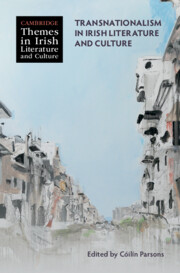Book contents
- Transnationalism in Irish Literature and Culture
- Cambridge Themes in Irish Literature and Culture
- Transnationalism in Irish Literature and Culture
- Copyright page
- Contents
- Acknowledgments
- Contributors
- Introduction: A Weak Theory of Transnationalism
- Part I Transnational Genealogies
- Chapter 1 “A World of New Wonders”: Maria Edgeworth’s Atlantic Ecology and the Limits of Transnationalism in the Nineteenth Century
- Chapter 2 “I’m apparently not famous anymore”: Appropriating Dion Boucicault’s Octoroon and Reckoning with Racial Violence in America
- Chapter 3 Destitute Recollection: Joyce’s Indian Translocations
- Chapter 4 “Under the shadow of the Monument”: On First Looking into Finnegans Wake
- Chapter 5 Eironesian Island Others: Irish Islands within Pacific Waters
- Part II Planets
- Part III Missed Translations
- Part IV Transnational Futures
- Select Bibliography
- Index
Chapter 3 - Destitute Recollection: Joyce’s Indian Translocations
from Part I - Transnational Genealogies
Published online by Cambridge University Press: 13 November 2024
- Transnationalism in Irish Literature and Culture
- Cambridge Themes in Irish Literature and Culture
- Transnationalism in Irish Literature and Culture
- Copyright page
- Contents
- Acknowledgments
- Contributors
- Introduction: A Weak Theory of Transnationalism
- Part I Transnational Genealogies
- Chapter 1 “A World of New Wonders”: Maria Edgeworth’s Atlantic Ecology and the Limits of Transnationalism in the Nineteenth Century
- Chapter 2 “I’m apparently not famous anymore”: Appropriating Dion Boucicault’s Octoroon and Reckoning with Racial Violence in America
- Chapter 3 Destitute Recollection: Joyce’s Indian Translocations
- Chapter 4 “Under the shadow of the Monument”: On First Looking into Finnegans Wake
- Chapter 5 Eironesian Island Others: Irish Islands within Pacific Waters
- Part II Planets
- Part III Missed Translations
- Part IV Transnational Futures
- Select Bibliography
- Index
Summary
Academic scholarship on James Joyce’s work has shown over the past three decades a shift toward the local, and has highlighted the deep embeddedness of Joyce’s work in Ireland, especially Dublin. This may be viewed as a move away from earlier “universalist” or “globalizing” readings, where Joyce’s stature as a modernist, his formal experimentation, and his anticipation of later conceptions of literary textuality occupied centerstage. How do we think Joyce’s location in our present? What in Joyce can travel, in space and in time? This chapter focuses on the persistent preoccupation in Joyce’s work – notably Ulysses and Finnegans Wake – with recollection, especially with modes of remembrance that extend beyond individuals to encompass multiple levels of the past. It examines the afterlife of this concern in India by discussing Mulk Raj Anand’s Untouchable (English, 1935), Devanoora Mahadeva’s Kusumabale (Kannada, 1988), and Anand’s Vyasanum Vighneswaranum (Malayalam, 1996). Through a consideration of forms of narration emerging from contexts where the relationship between instituted archives and literary citation is rendered difficult, the chapter delineates “destitute” modes of recollection foregrounded in strands of Indian modernism.
Keywords
- Type
- Chapter
- Information
- Transnationalism in Irish Literature and Culture , pp. 65 - 81Publisher: Cambridge University PressPrint publication year: 2024

